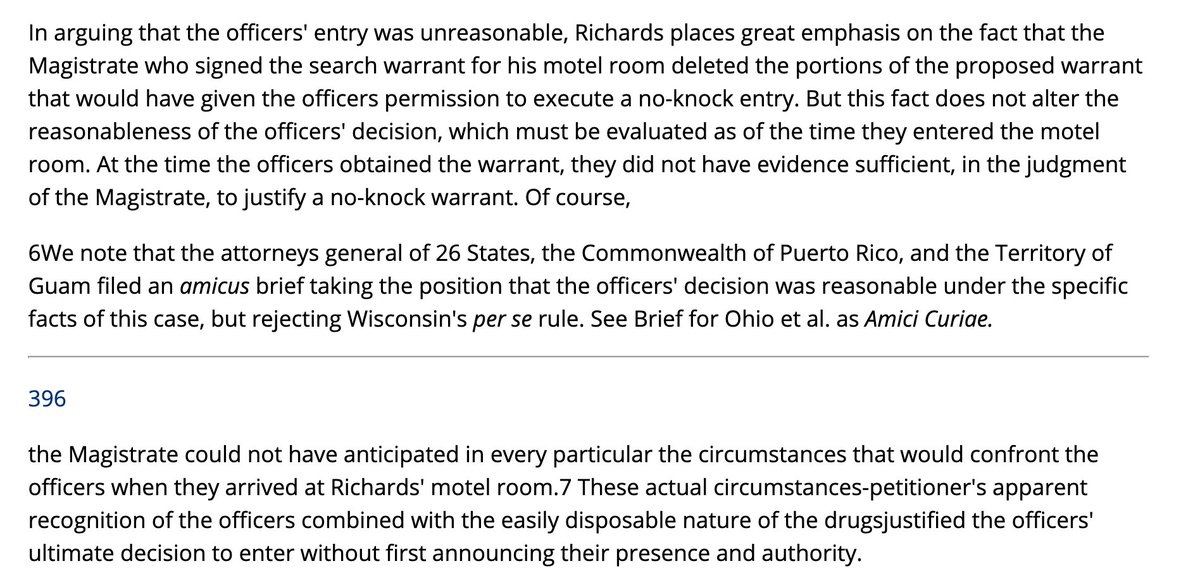I have a question about the way the police executed the warrant in the home entry that resulted in Breonna Taylor& #39;s death. It& #39;s about a part of the knock-and-announce practice in that case that I don& #39;t think I understand.
(Thread.)
(Thread.)
4th Am law contemplates two circumstances. In the ordinary case, the officers knock, announce that they are the police, and then wait, all before entering. The knock and announce alerts people inside to the fact that it& #39;s the police. And waiting gives time to open the door.
In the special case, the officers do not need to knock and announce, see Richards v. Wisc below. Officers execute the warrant by surprise, bursting in the house with no notice, so that people inside have no time to do anything like threaten officers or destroy evidence.
The warrant in this case authorized a no-knock entry. But as Richards v. WI makes clear, the magistrate& #39;s decision doesn& #39;t have any particular legal affect. Instead, the call about whether to knock and announce depends on the circumstances when the officers execute the warrant.
Following Richards, the officers decided to execute the warrant as a regular knock-and-announce warrant. They claim that they knocked and announced. But whether they actually announced is unclear. 11 of 12 witnesses heard no announcement, & 1 heard only a single statement.
Let& #39;s assume that the police did *not* announce their presence, at least loudly enough to be heard. Here& #39;s the part I don& #39;t understand. Is there any reason, other than sheer incompetence, that officers would execute a warrant that way?
I understand the arguments for requiring knocking and announcing. And I understand the arguments for an exigent circumstances to that. But what I can& #39;t understand is why on earth an officer would knock BUT NOT ANNOUNCE.
Knocking but not announcing seems to be the worst possible option. Banging loudly on the door (as police do) tells the person inside that SOMEONE is outside and angry and may be about to break in. But w/o announcing, the person inside doesn& #39;t know WHO IS OUT THERE.
And the most immediate threat is to the OFFICERS THEMSELVES. The person inside who has a gun is going to prepare for the possibility that he& #39;ll need to use the gun to defend himself and others against possible intruders.
And it sets up what apparently happened here: A person inside acts in self-defense shooting officers b/c the police knocked but didn& #39;t identify themselves, and officers shoot back in apparent self-defense b/c they didn& #39;t realize the person inside didn& #39;t know they were police.
What gets me is that the officers& #39; self-interest is in making sure the ANNOUNCE part of the knock-and-announce is loudly and clearly made. That& #39;s the part that prevents officers from being shot at in self-defense (especially with a nighttime warrant, another big issue here).
Of course, I recognize the debate over no-knock warrants generally. But I wonder if the issue directly raised in this case is somewhat different: Total incompetence about HOW to knock and announce.
Anyway, curious if others have any explanation for why the officers might have executed the warrant in they way they did, other than because of their sheer incompetence. (And if you disagree with my understanding of the facts, that& #39;s helpful, too. Thanks.)
(And sorry for the all-caps. To be fair, though, I am actually shouting this question.)

 Read on Twitter
Read on Twitter



